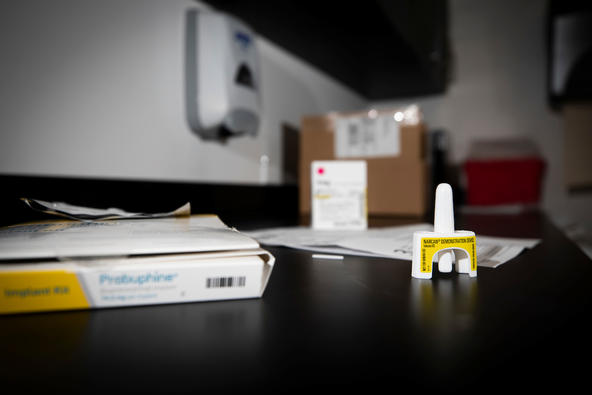HEAL, Voices of Hope, Madison County Detention Center Partner to Increase Access to Medication for Opioid Use Disorder

The University of Kentucky’s $87 million HEALing Communities Study has partnered with Voices of Hope and the Madison County Detention Center to increase access to medication for opioid use disorder for people who are being released from the jail.
The Madison County Detention Center, under the leadership of Jailer Steve Tussey, detains about 5,600 people per year. The jail is located in Richmond, Ky. and does not currently have a substance use treatment program. Madison County is one of the 16 Kentucky counties participating in the HEALing Communities Study. The study has the ultimate goal of reducing opioid overdose deaths by 40% in participating communities that represent more than a third of Kentucky’s population.
“The Madison County Detention Center is excited to add this missing piece to the lives of the population of this facility,” Tussey said. “Our truest hope is to provide an avenue to stop the cycle of incarceration and provide the support necessary to return to productive citizenship.”
Voices of Hope is an organization that helps people in recovery stay in recovery by providing no-cost recovery support services, conducting research, and educating and advocating for the community they serve. The organization’s overarching goal is to enhance the quantity and quality of support available to people seeking and experiencing long-term recovery from alcohol and other substance use disorders.
Under the new partnership, HEAL grant funds are used to place a Voices of Hope peer support specialist full-time in the jail to offer education and services to every person who is being released, including:
-
Opioid overdose education
-
A free naloxone (Narcan) unit
-
Assistance for people who are interested in being screened/assessed and connected to medication for OUD
-
Help in addressing barriers to treatment, such as insurance issues or lack of transportation
Peer support specialists are people in recovery who are trained to help those who want treatment for substance use disorders. Having someone who understands that experience can be a game-changer for those seeking remission and recovery, says Gary Biggers, a peer support specialist with Voices of Hope.
“Every time I was incarcerated, I never had any intention of getting out and staying sober. But if I had had a peer support specialist who was willing to sit with me and help me come up with a plan of action upon my release, my chances of recovery would have been higher,” Biggers said. “I would have had someone to talk to so I wouldn’t feel so alone, someone who could understand what I have been through, and someone to help me get linked with treatment. I wish I had had someone who I felt like was really in my corner.”
The risk of overdose is increased when people are released from a correctional facility – because they have gone for an extended length of time without using an opioid, their tolerance for the drug has decreased significantly. An attempt to use the same amount of opioid may lead to overdose or death.
“Due to their diminished physiological tolerance to opioids, people are at a significantly elevated risk of an opioid overdose in the first two weeks after they’re released from jail,” said Carrie Oser, Ph.D., professor of sociology in the UK College of Arts and Sciences and a lead researcher on HEAL. “Having a peer support specialist on-site to speak with people about their options for finding medication treatment for opioid use disorder before they’re being released is incredibly important, because medications have the strongest efficacy in preventing overdoses.”
By offering education, support and evidence-based treatment to people during a critical time in their life, the groups hope to reduce overdose events and deaths and give the formerly incarcerated the tools to help them begin a new trajectory in life. This partnership is being facilitated by Oser and Melissa Reedy-Johnson, who is a member of the HEAL implementation facilitator team and a resident of Madison County.
“The opioid epidemic has had and continues to have a devasting impact on so many lives in Madison County,” said Reedy-Johnson. “I feel grateful and fortunate, as a resident of Madison County, to work beside my community members to provide services that will save lives.”
Credits
Allison Perry (Public Relations & Strategic Communication)

